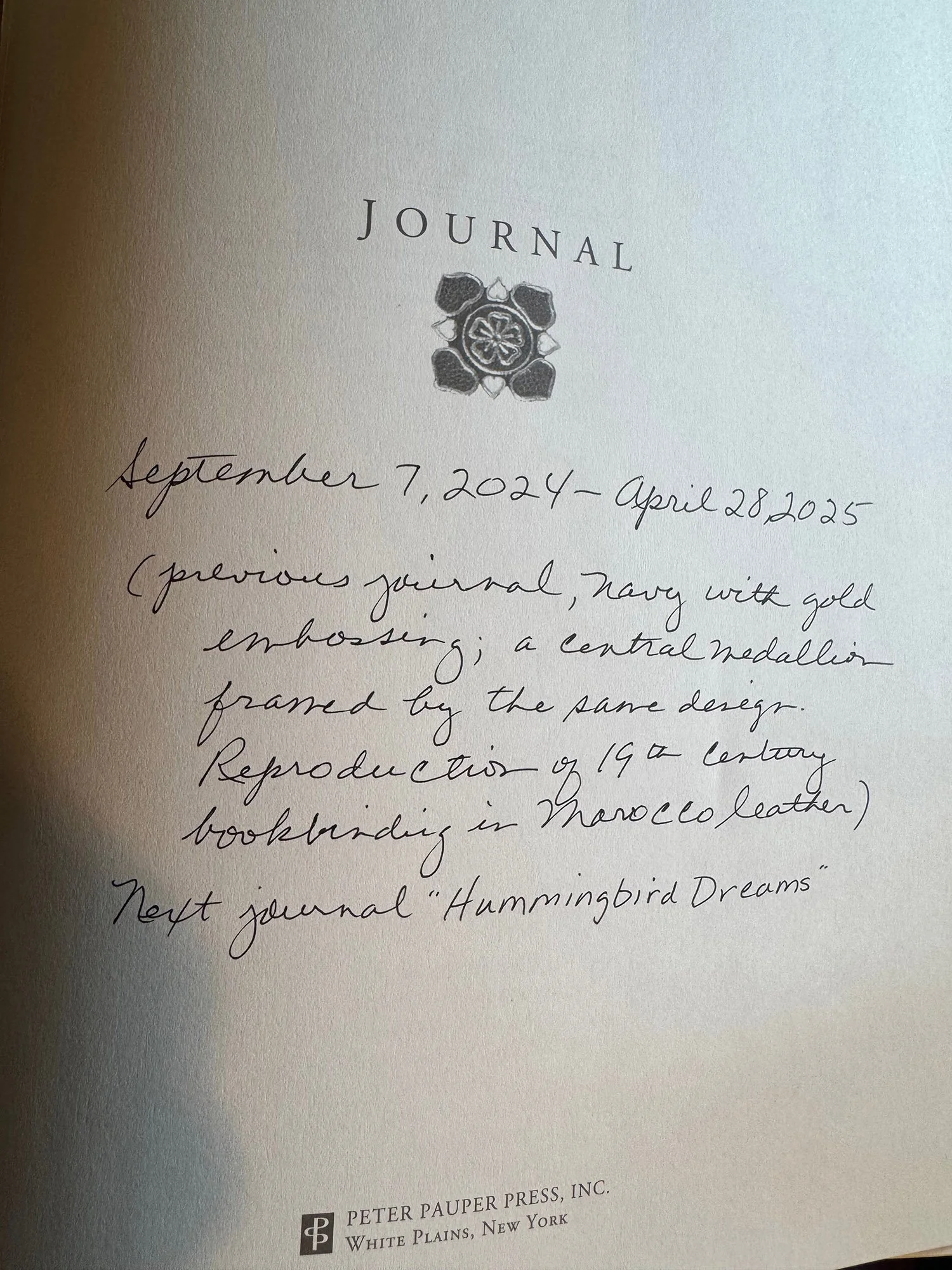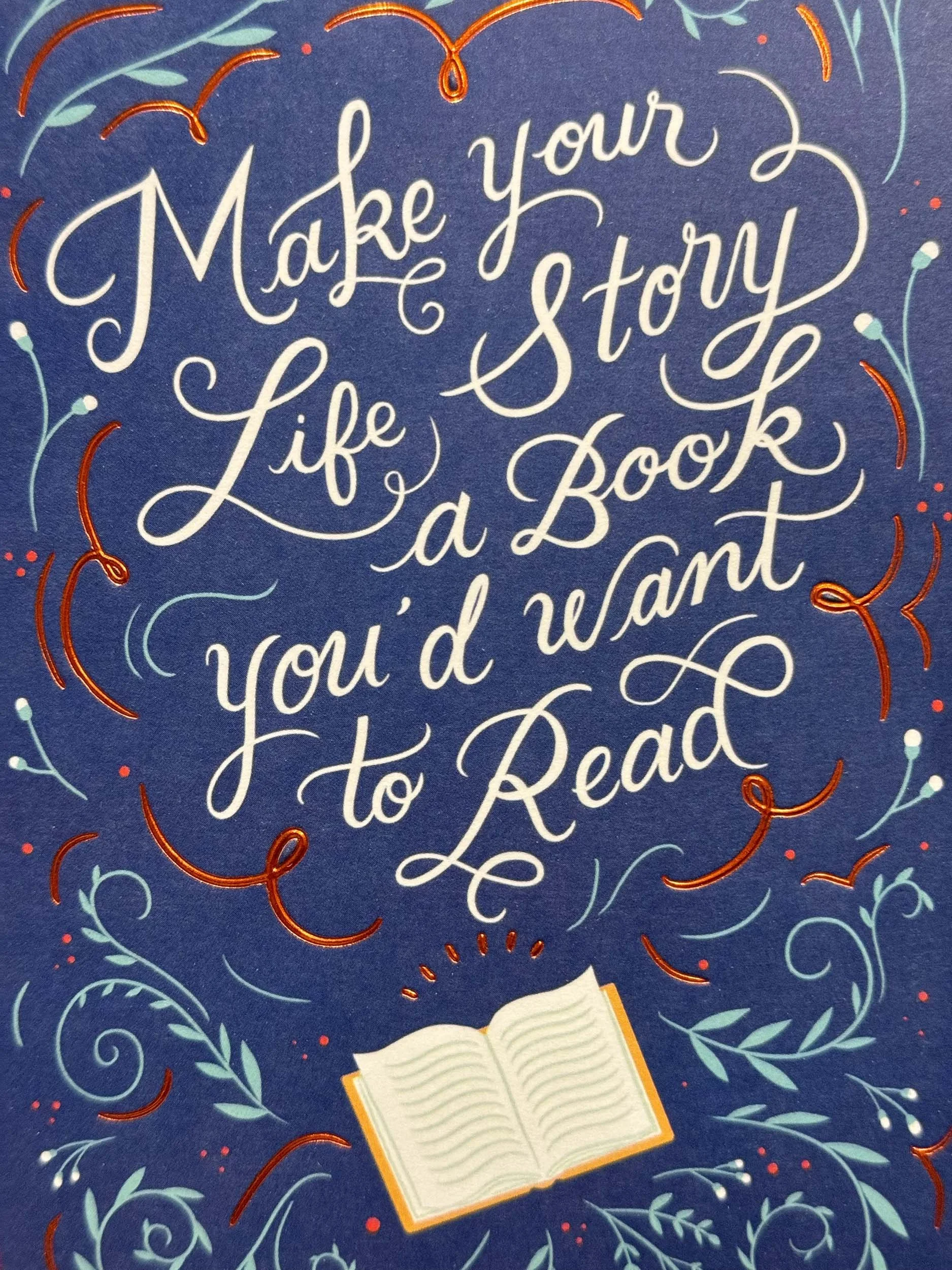Notes to Self
The most consequential writing I do turns out to be for myself.
I have written in journals for decades. Counting the red diary with a tiny lock I received for my tenth birthday, I started writing in elementary school. Skip ahead to 9th grade, crushes on boys and squabbles with girlfriends, scribbled notes make for embarrassing and laughable reading. UGH! Was I really that dumb? That young? That ridiculous?
Writing has helped me figure out what I think. I never appreciate what I actually feel about something or someone until I have wrapped words around ideas, stories, books, movies, or personal experiences. This explains one reason Frederick Buechner’s repeated statement resonates. “Pay attention to your life.”
I urge people to read widely and to also write about their life.
Writing about your life is something you do to grow, to mature, to gain wisdom, to remind your future self where you have been and what you have come through.
My current journal (Peter Pauper Press Journals, 192 lined pages, my favorites)
My previous journal, (Antique Blossoms Journal, Peter Pauper Press)
How I keep track of dates covered in each journal
I write on the title page of a new journal the date I begin writing. When I have filled a journal, I go back and write the date of the last entry. I also started describing the previous journal, its cover, to easily locate preceding dates and then too, the next journal that follows the one just completed.
I’m away from home now. On vacation. I brought with me my previous journal because I want to share with you––Readers––what I had written last September.
Notes to self taken from other writers describe some of the benefits of writing about your life.
“I write entirely to find out what I’m thinking.”
On September 20, I read an email from Ann Voskamp titled “You’ll Live a Different Life If You Start Telling Yourself a Different Story: How Journaling Can Change Your Life.” (linked below, [1])
Because I agree and didn’t need convincing, I could have stopped reading. Instead, copied in my journal, here’s some of what she wrote:
“Stringing your thoughts together with lines of ink––begins to unknot and rewire the processes in your mind. Because the Word Himself made your mind––the process of journaling words begins to remake your mind. Ink is more than just cheap therapy––it actually begins to rewrite your one precious mind.”
“Keep thy heart with all diligence; for out of it are the issues of life”
I believe writing helps me process emotions in a way speaking cannot. Saying what I think or feel is only the tip of the iceberg of whatever situation I am trying to process. Short term crisis or long term problems, the long and winding road of hurt, pain, misunderstanding, and even extraordinary moments of joy, journaling helps me remember.
Ann Voskamp cited research on how journaling helps “to create many autobiographical connections between life events.”
“ . . . writing things down will write new patterns into thinking, will write a new script into your life . . . you are always telling yourself story upon story.
You are not telling your heart to beat, and you are never not telling yourself a story . . . none of our stories are linear . . . just as this world The Word made circular, so our stories our circular . . and in returning again and again to our stories, this reviewing of our stories actually gives us a different view of our story.
We only understand parts of our story through distance––and the distance from our hearts to the end of our pens.
. . . Fall victim to small stories––and you live a shriveled life.
Live large, magnanimous, generous, charitable stories––and you’re given a large, generous, magnanimous life.
“The story you tell yourself ends up shaping your life.”
Circles inside Circles
“Circles inside circles,” I’ve been saying this for years! The idea spawned and retrieved from an old Carol Burnett sketch with Madeleine Kahn stays with me. And too, Buechner’s words reinforce how “our stories intersect and overlap”––again, a picture of circles.
In the Western literature, our stories unfold in a line––linear––we try to make sense of stories chronologically. But Eastern literature is circular, an unwinding and overlapping, a complex intersection of characters and their stories’ effects on each other.
Once in a BSF lecture, I compared our lives to circles.
My sister died when she was seven years old––her circle complete. My dad at age 30, his circle too––his entire lifetime––fulfilling what God ordained.
“Your eyes saw my unformed body; all the days ordained for me were written in your book before one of them came to be.”
Not one day too soon or too late, even though with both my sister and my dad’s deaths, mine and my mom’s lives were irrevocably changed. My mother’s circle was complete at age 67.
A line is an infinite series of points continuing in both directions. A circle, also made up of points, has a beginning and an end. So too, the Bible tells us, each of our lives has a beginning and an end.
“So teach us to number our days, that we may apply our hearts unto wisdom.”
Writing about Your Life: Its Own Incredible Journey
Journals, Diaries, and maybe a Book
A journal is life unedited, a first draft of what you’ve lived through.
A diary is a daily record of events without reflection upon what happened.
A book is life edited with all the boring parts left out. Thankfully, the boring parts fill most of our hours.
If you live long enough, you will thank God for the ordinary days––the days without crisis and chaos and fear. Save those days tangled with questions for your own book.
In a way, I have already written “books” in my journals, however, not books anyone would want to read or anything I want read till I am long gone. Whew!
As I said, the significance of what I write is more to my future self, those times when I pick up an old journal and see myself a work in progress, seeking to make some progress.
I look forward to writing to each of you who read this blog. This blog is long enough. More next time.
[1] Ann Voskamp





